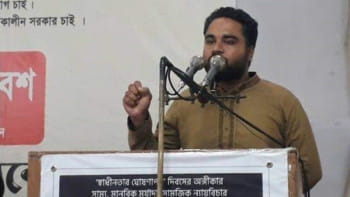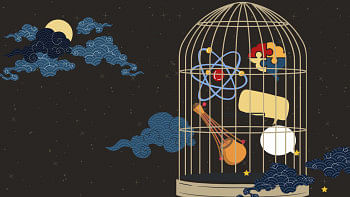When the state defeats its people

The draconian Digital Security Act (DSA) strikes again, and most worryingly, in collusion with communal bigotry. This time, police arrested Pritom Das, a leader of left-leaning organisation Rashtra Sangskar Andolan, on September 9 in a case filed under the DSA for allegedly hurting religious sentiments. The case was filed by Mahbub Alam Bhuiyan, an activist of Bangladesh Chhatra League, on September 4. He accused Pritom of hurting religious sentiments and undermining the country's sovereignty through a Facebook post.
Let's see what that post was.
Published on July 8, 2022, the post reads, "Someone asked Saadat Hasan Manto, the great Urdu story writer, how is your country? He replied, 'Just like the Friday prayers in jail. A fraudulent inmate offers the call to prayer, the imam is a murderer, and the worshippers are all thieves'" (The original post was in Bangla).
The same quote was used by historian Prof Muntasir Mamun in an online article published the previous day, and by M Naser Rahman, son of former finance minister M Saifur Rahman and a former member of parliament from Moulvibazar 2 constituency, on July 28. However, they were not sued for using the quote.
Dear readers, did you find anything offensive to religion and state sovereignty in Pritom Das' post? It shouldn't hurt anyone except frauds, murderers and thieves. Religion never condones bigotry, and the sovereignty of a state is created and sustained by the consent of its people, not by the government or the law enforcement agencies loyal to them.
Manto, in his short life of 42 years, faced such allegations several times; therefore, he can explain the motive behind these accusations better than anyone: "When these leaders cry their hearts out telling people that religion is in danger, there's no reality to it. Religion is not something that can be endangered. If there is a danger, it is to these leaders who endanger religion to achieve their own ends."
Now, let's look at the background events leading to the arrest of Pritom Das. It will help understand Manto's insight.

On August 27, as Pritom and his comrades were staging a protest in Sreemangal's Chaumohana Chattar in solidarity with the tea workers' demand for a daily wage of Tk 300, a group of 56-60 activists of the ruling party led by the former general secretary of Sreemangal municipal unit of Chhatra League, Abed Hossain, attacked Pritom's group in the police's presence. Police, however, played the role of a silent spectator. Pritom and his nine comrades were injured in the incident. On that afternoon, they held a press conference condemning the attack and demanded immediate arrest of the perpetrators, including Abed Hossain. They also blamed police inaction for the incident. The attack was widely criticised on both online and offline platforms. So far, the police haven't taken any action against the attackers.
Three days later, 52 days after the appearance of the Facebook post, the same Abed Hossain brought allegations of insulting Islam against Pritom. He made a social media post demanding that Pritom be brought under the law. His followers jumped into spreading the word.
The next day, a protest was brought out from a local mosque under the banner of "Sreemangaler Dharmapran Muslim Janata," and they demanded Pritom Das' immediate arrest. An ultimatum was issued that if he were not arrested before the Jummah prayer of September 2, protest marches would be brought out from all the local mosques. They also called upon local Muslims to join the protest. It created huge panic among the local Hindu population.
Isn't this the same old script? Since the Ramu attack a decade ago, communal violence has been carried out again and again, following the same formula of raising false allegations of demeaning religion through Facebook posts. This is also not new that political, social and religious influentials and groups with vested interests are the masterminds behind communal attacks. In Rangpur's Pirganj upazila, for example, a local Chhatra League leader, along with his accomplices, instigated the mob to burn down homes and shops of the local Hindu community on October 17, 2021 over a doctored Facebook post.
However, this time their plan didn't work out. The local people, particularly religious leaders, didn't walk into their trap. Most importantly, Pritom Das stood strong and didn't give in to the demand for seeking an apology. The united stand against communal provocation showed the path of resistance to the abuse of religious sentiments by political opportunists, and this feat of Sreemangal's people was widely celebrated.
Unfortunately, the defeated forces struck back by weaponising the Digital Security Act. This time, the local police acted over-enthusiastically. Pritom Das is now languishing in jail. The vaguely worded law on digital security has created its own moral brigade, and, unsurprisingly, the ruling party activists are leading it. They feel entitled to enforce their parochial interest as morality, and that has created a new political dispensation which mandates an atmosphere of violence and fear.
The role of the local administration is no less frustrating. If not complicit in the crime, they played into the hands of the communal bigots. In the case of Jhuman Das, they failed in the same way. Instead of taking action against the Hefazat activists and supporters who attacked and vandalised the houses of minorities in Shalla, Sunamganj, they implicated local youth Jhuman Das in a DSA case, who warned in a Facebook post that the hate speech preached by the Hefazat leaders would disrupt communal harmony in the area. He suffered in jail for over six months before being released on bail by the High Court in September 2021. He was arrested again on August 30 this year in another flimsy DSA case. The government has devised a unique formula for tackling communal tension: arrest the victim to calm down the perpetrators! Doesn't it constitute a defeat of the people by the government, which has no legitimacy without their popular will?
Pritom Das' Facebook post containing Manto's quote has turned out to be distressingly prophetic in the present context of Bangladesh. Shouldn't we be worried about it?
Shamsuddoza Sajen is a journalist and researcher.

 For all latest news, follow The Daily Star's Google News channel.
For all latest news, follow The Daily Star's Google News channel. 










Comments